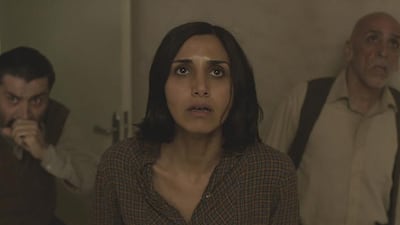Under the Shadow
Director: Babak Anvari
Starring: Narges Rashidi, Bobby Naderi, Avin Manshadi
Four-and-a-half stars
Babak Anvari's horror film Under the Shadow, which is set during the Iran-Iraq war, had its world premiere at the Sundance Film Festival in Friday night's coveted midnight slot.
If the thunderous applause from the audience in a sold-out Egyptian Theatre is anything to go by, the Iranian-British director looks destined for further international acclaim to add to the Bafta nomination he received for his previous film, Two and Two.
Even before its debut, Under the Shadow was celebrating an initial success, with the news that Netflix had acquired the worldwide streaming rights. On Saturday, it was revealed that Vertical Entertainment and XYZ Films will give the film a global release on digital and video-on-demand platforms, plus a cinema release in select territories.
Set in Tehran in the 1980s, during the most brutal days of the 20th-century’s longest-running conventional war, the film sets the audience up to expect social commentary on the political, gender and social issues of the day.
Shideh (Narges Rashidi) has been blocked from continuing her medical studies because of her involvement with radical left wing groups in pre-revolutionary days. Her husband Iraj (Bobby Naderi), a doctor, is far from supportive, and criticises both her desire to complete her studies and her ability to care for their daughter Dorsa (Avin Manshadi).
So far, it seems like the sort of social commentary you might expect from a serious drama set in a troubled country during turbulent times.
And it stands up admirably in that genre, bringing some welcome humour to the table too.
But then it almost imperceptibly segues into horror. With Iraj drafted to serve at the front, Shideh is left to care for their daughter alone.
As the Iraqi bombardment of Tehran intensifies, things start to get weird.
Items disappear, strange noises are heard – and the djinn are mentioned in hushed, initially jokey, mocking tones.
When an Iraqi missile tears through the roof of Shideh's apartment building, but fails to explode, it starts to look like it really may have brought a djinn with it. This change in genre might have jarred – but this is no From Dusk Till Dawn-style two-films-for-the-price-of-one affair. The development of the supernatural horror is gradual and seamless.
Gently haunting images of children playing in Shideh’s war-ravaged courtyard mirror the possible haunting taking place upstairs, while the perpetual air raids give a looming sense of doom long before any apparitions come into play.
The gradual departure of fleeing neighbours builds an increasing sense of Shideh’s isolation and helplessness.
Without giving anything away, when the climax comes, Anvari takes no prisoners.
The closing act is more akin to a white-knuckly ride on a particularly ferocious ghost train than a traditional horror movie.
Films in this genre tend to stick to a very specific rhythm – a jump here, a lull, a final confrontation.
Anvari is having none of that. As the previously sceptical Shideh, and the audience, begin to suspect that something really is haunting the apartment, the tempo and the scares are relentless. While the shocks earlier in the film were met with appreciative giggles from the audience, they were increasingly greeted by genuine shrieks of shock as Shideh’s ordeal intensified.
When in 2014, following the critical success of Ana Lily Amirpur's A Girl Walks Home Alone at Night, I suggested that we could be on the verge of a new wave of classic Iranian horror, I was only half joking.
On the evidence of Under the Shadow – and given the audience's reaction and the fact it has already been picked up for global distribution – I may have been on to something.
cnewbould@thenational.ae

